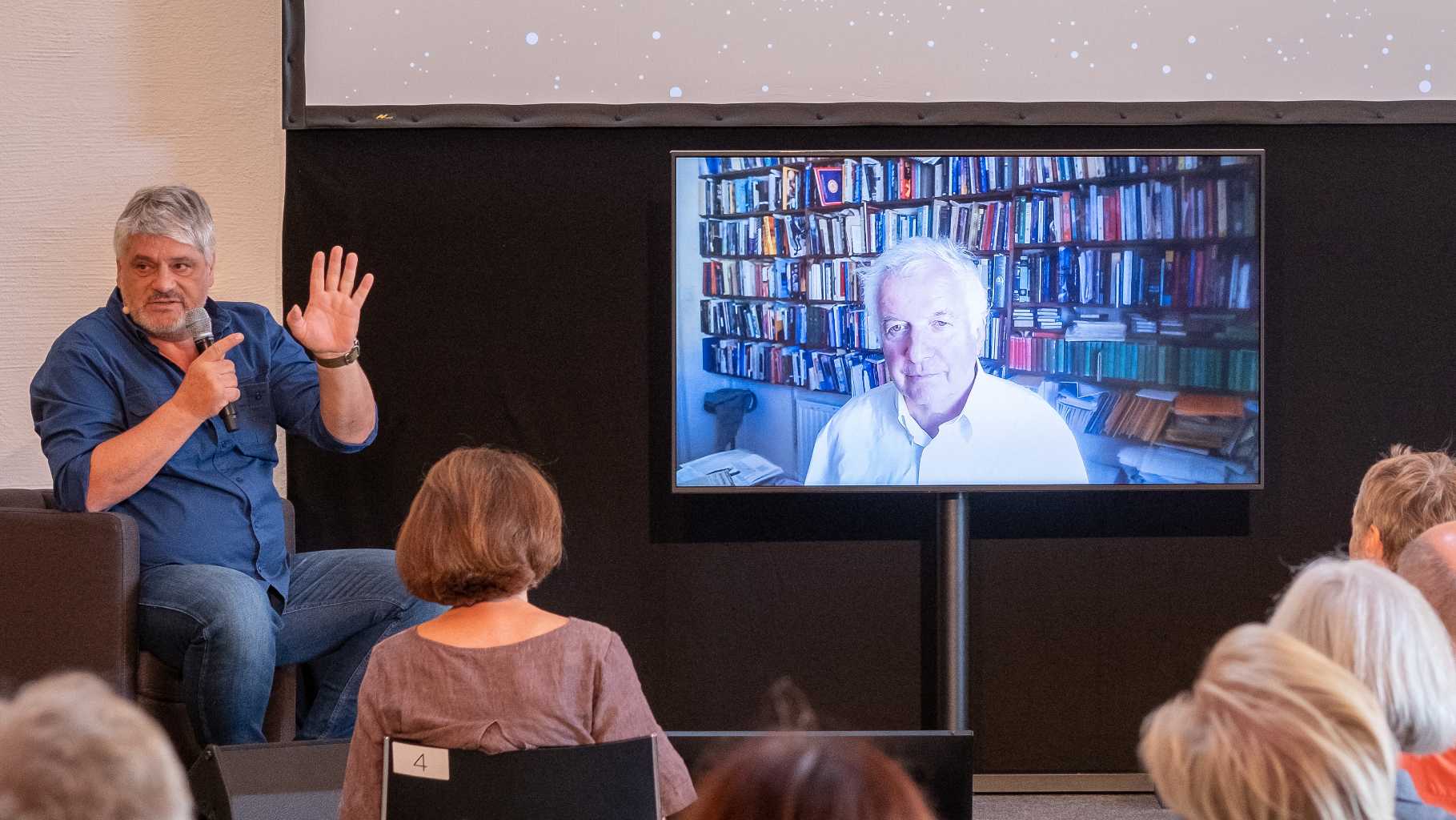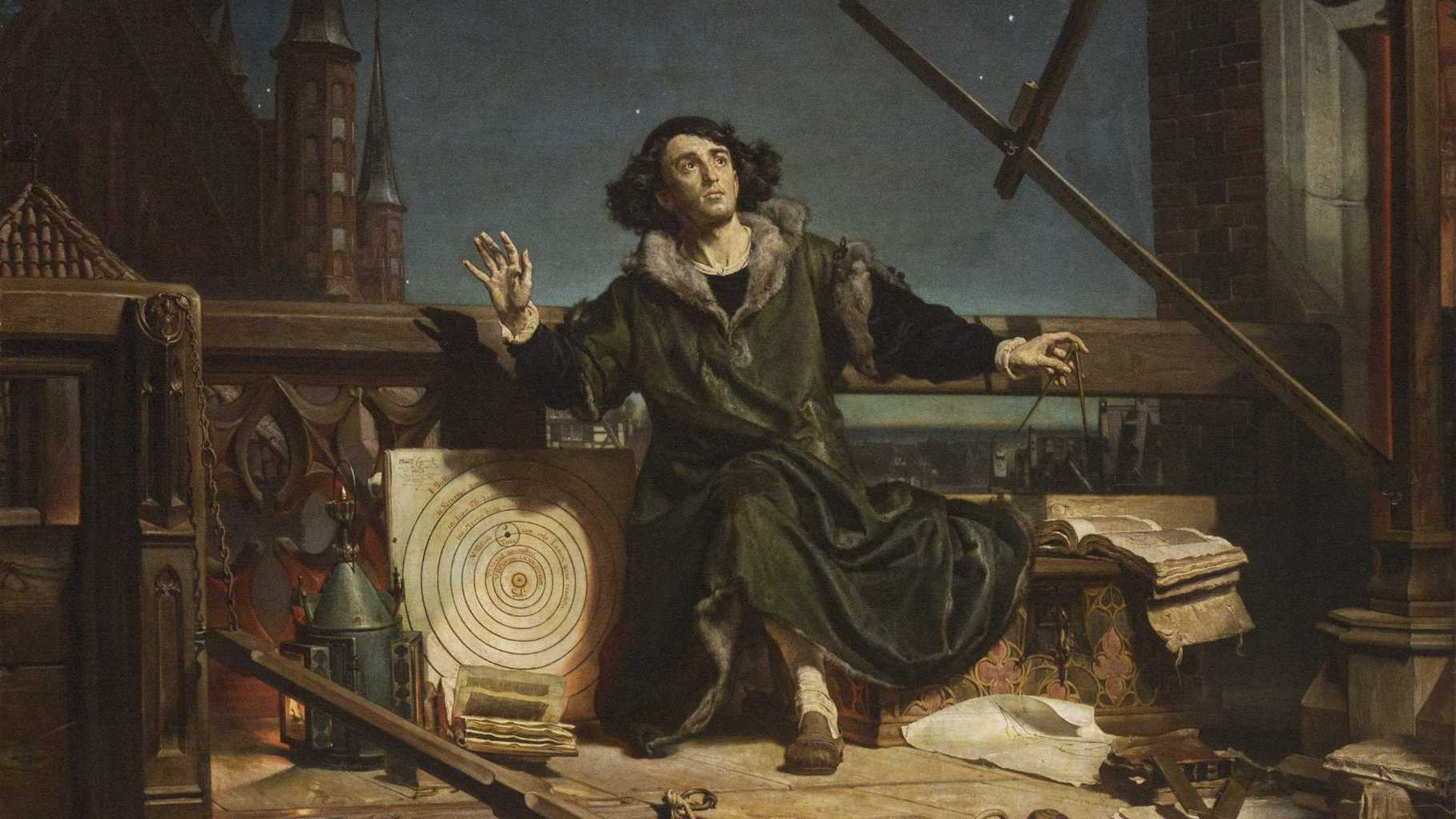
Sibylle Anderl at the STERNENHIMMEL DER MENSCHHEIT Festival 2021 © Mathis Beutel
The Conquest of the Heavens
Sibylle Anderl
Sibylle Anderl – astrophysicist and philosopher of science – in conversation about looking and wonder, about the limits of knowledge, about detective work and the creative magic of astronomy
"Astronomy is the most creative science", said Florian Freistetter at the STERNENHIMMEL DER MENSCHHEIT festival in 2021. All we can do is look – we are denied direct contact. That's why we've learned to look better than anyone else." Is that true?
What is definitely true is that astronomers and astrophysicists are very, very good at looking, as can be seen from the fact that certain imaging techniques have been transferred to other scientific disciplines, for example to medicine. It’s also true that all we can do is look – we cannot interact with things in the universe, experiment with stars or with black holes. The fact that we have learned to look particularly closely is certainly true. But we have also learned to argue in particularly sophisticated ways and to work with complex models. We work like detectives: we look for clues in the universe that give us points of reference in dealing with about processes that took place long ago, and then, based on this evidence, we try to construct stories that explain why we see exactly what we see. In this respect, in astrophysics today it is not only about looking, but also the physical understanding of what you see.
Of course, first of all, there is this incredible cultural-historical treasure-trove that stands behind modern astronomy – because people have always looked up into the sky. The many different myths and stories, modes of representation and ideas that can be unearthed over the centuries and millennia and that all still resonate in us today.
Then there is astronomy as a science of images. It is always very much about seeing, about acquiring images, about thinking about how to build telescopes, how to evaluate data in such a way that you can make certain things visible. Of course, this also establishes its very strong proximity to art – in addition to the obvious aspect of astronomy, that it delivers aesthetically beautiful images that you would also hang on the wall.
Then there is how astrophysics affects the idea of our own humanity: the feeling of humility, the wonder that it instills in us – which can also lead to it being related creatively to things that you can perhaps better grasp as a human being.
Then there is something that Herr Herrmann always pursued with special interest: the ancient connection between cosmology, geometry, sound, and music, which goes back to the ancient Greeks. The fact that the cosmos oscillates: the planetary orbits, their radii, which are in certain numerical ratios to each other, can be interpreted geometrically and transferred to the length of strings on stringed instruments – so that in this way one arrives at the harmonies of the cosmos. In String theory too, it is a question of the tiniest, oscillating threads from which everything could be built. Based on cosmic background radiation, the first baby-photo of the cosmos, you can see that the universe was in vibration shortly after the Big Bang. This motif is something that has, since ancient times, always been found in connection with the cosmos: Keppler's search for harmonies; Aristotle with the crystal spheres; Galileo Galilei's father was a music theorist; Einstein, who played the violin and gave his sister a grand piano, which is still to be found in the Astronomy Observatory in Florence today.
Yes, on many levels, the cosmos inspires us to express ourselves artistically. It's an incredibly close connection – and a fruitful exchange. Because even in astrophysics you must keep learning over and over to look anew. You can see things without really recognizing them: because you’re not paying attention to them or weren’t expecting certain kinds of discovery. This kind of expansion of viewing habits, inspired by art, can also help us to take on new perspectives in science and thus perhaps discover things that we simply could not see before, even though we had looked at them.
You yourself combined your studies of philosophy with astrophysics. What was your aim in doing this?
I don't think I knew beforehand how closely the two subjects belong together. In theoretical physics, you are constantly moving in philosophical terrain. One tries to understand quantum theory, the theory of relativity, the underlying structures of space and time, the question of the limits of human knowledge, and indeed the more general question of our justification for claiming that good science produces reliable knowledge.
What difference does it make compared with other disciplines that in astrophysics we can only observe and not experiment? I have wrestled with this question particularly after a philosopher in the eighties said that astrophysics generates less reliable knowledge for this reason. Of course, I have come to the conclusion that it is not quite as simple as that – we simply have a more indirect access to the cosmos. What is true, is that in astrophysics we are often faced with situations in which we must derive a great deal from very little information. That it works so consistently, that our description fits at every point on the scale – from the interstellar, to the stars, the galaxies, galaxy clusters right up to the cosmos as a whole – and gives a coherent picture, I always find that very impressive.
We find ourselves existing in the middle of an immeasurable universe. How do you deal with this also being the centre of your professional life too?
Using mathematical tools gives you a certain degree of security in dealing with the universe. You can operate on a theoretical level, busy yourself using mathematical ways of describing the universe and then there is no problem with periods of billions of years or thing being many billions of light years away. But if you try to relate that to things you know from everyday life, you think: it is incredible what I am dealing with in my professional life! That's why, I think, many astrophysicists like to discuss their preoccupations in public: you are suddenly back in the position of the astonished observer on Earth.
Science reaches its limits when it comes to questions of meaning
Where does the incomprehensible begin, for you as an astrophysicist?
Science reaches its limits when it comes to questions of meaning. Why is the universe exactly like this? Why do we exist as creatures in it? The sheer amazement at the laws of our own existence leads relatively quickly to the fact that one reaches limits. Cosmology is the scientific discipline in which the limits of one’s knowledge are most clearly demonstrated. Who can imagine a four-dimensional curved space-time? Who can imagine what was before the Big Bang? And that leads to the fundamental question: could it be that our scientific approach to the world itself has limits? Are there certain questions that we should be able to answer scientifically, though in fact we will never be able to answer them? Because the human mind is not created for this, is not universal enough? But the fact that we humans are even able to reconstruct the history of the universe from the Big Bang – 13.8 billion years in the past – to today is already a kind of miracle. In this sense, astrophysics is a science that always amazes you – and thus always brings you to the limits of human cognition.
Something draws us up into the sky, but at the same time there is a feeling of horror
The view of the stars also shows us about life and death. What do the heavens have to do with us humans? We are not simply part of the universe but are made of it too.
Absolutely. And that's another aspect of the magic of astrophysics: it's the oldest science we have, people have always wondered what's happening up there in the sky. Something draws us up into the sky, but at the same time there is a feeling of horror, because we feel small, and transient compared to the gigantic dimensions that exist out there. "Why explore the cosmos; it has no practical relevance for us at all!" This is something an astrophysicist often hears. At the same time, astrophysics is one of the most popular disciplines; people are genuinely interested in it. Aristotle said way back that what distinguishes us humans is curiosity, the joy of knowledge. And this is expressed in a particularly pure and unspoiled way in the exploration of the cosmos. The fact that you can still inspire people in today's world by telling them stories about the cosmos has something very beautiful and reassuring about it, because this is what makes us human at our core.
The stars of the night sky provide a form of orientation that gives us security
A fascination with the stars of the night sky is something that is probably in every human being, from childhood on. But are we aware of this?
It provides a form of orientation that gives us security. But it is also one of those things that you only notice when they are no longer there – when you travel to the southern hemisphere, for example, and the sky and moon suddenly look different. This leads to the question of how important it is to protect the night sky as we know it. Today, when there are more and more satellites, megaconstellations, near-Earth space has become an environment, a region that companies and nations are working hard to explore, and it is the subject of great rivalries. So, one can predict that a good deal will change in the coming decades, which will affect all people. For that reason, this is also a worrying development, because we will probably only notice it when it is too late.
To what extent are satellites a problem?
At the moment we have a few thousand satellites, but it will soon be a few tens of thousands. That means that there will simply be very, very many bright dots that will sail across the sky and fundamentally change the sight that we have shared with our ancestors over many millennia. This will be a massive change for all people, because there will be no escape, it will affect everywhere on earth. Despite great relevance of this issue, however, it is discussed surprisingly little in public.
Astrophysics is very good at telling stories
When it comes to the "stars", science and popular science are close to each other. Is that a "bad" thing?
I don't think that's a bad thing at all. Especially after two years of living with the pandemic, we have learned how important scientific understanding is in the public realm too. Understanding the scientific method is ultimately relevant to democracy. This is the only way to gain confidence in relying on scientific facts. Astrophysics is very good at telling stories – there is a lot of information that can be conveyed very well. It lends itself to analogies: the lifespan of stars, the interaction with their environment, or how different galaxies merge. All this has a remarkably visual quality. When you then appreciate how much detective work is behind it all, how some hypotheses only unfold over decades, how many generations of scientists work on something, then I actually find it even more fascinating.
Imagining what is happening up there is something that unites all the people of the whole earth. Is that the reason why there are so many stories, many of them ancient, about the stars?
Yes, and this is again touches on the question of method. How do we see the world? How do we understand it? This is where philosophy comes into play again. What is the human aspect of our view of the cosmos? Every science is man-made. There are many places we work with assumptions, with uncertainties, with the problem that we simply have to try different things out. Generating reliable knowledge that is as objective as possible is what makes science so exciting and also opens up some interesting philosophical questions.
Would you, like Raoul Schrott, want to reinvent the constellations of our night skies so they have more to do with our modern life, perhaps even with the day-to-day lives we live?
I don’t know. In a way I believe, that we – as astrophysicists – have in fact already conquered the heavens anew through the stories that we tell about what opens up as it were beyond the constellations.
© STERNENHIMMEL DER MENSCHHEIT / Teresa Grenzmann / Translation: Karen Leeder

